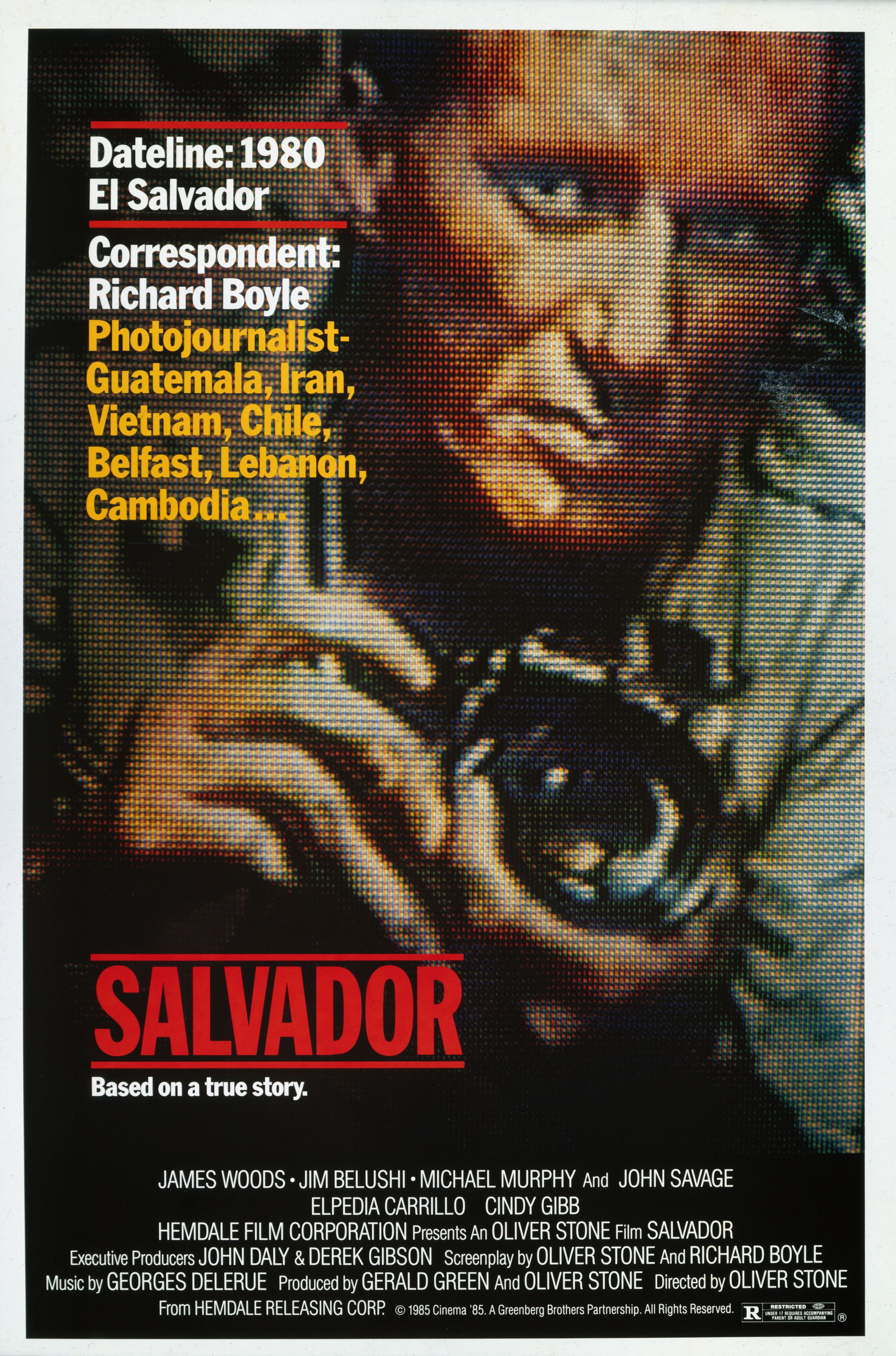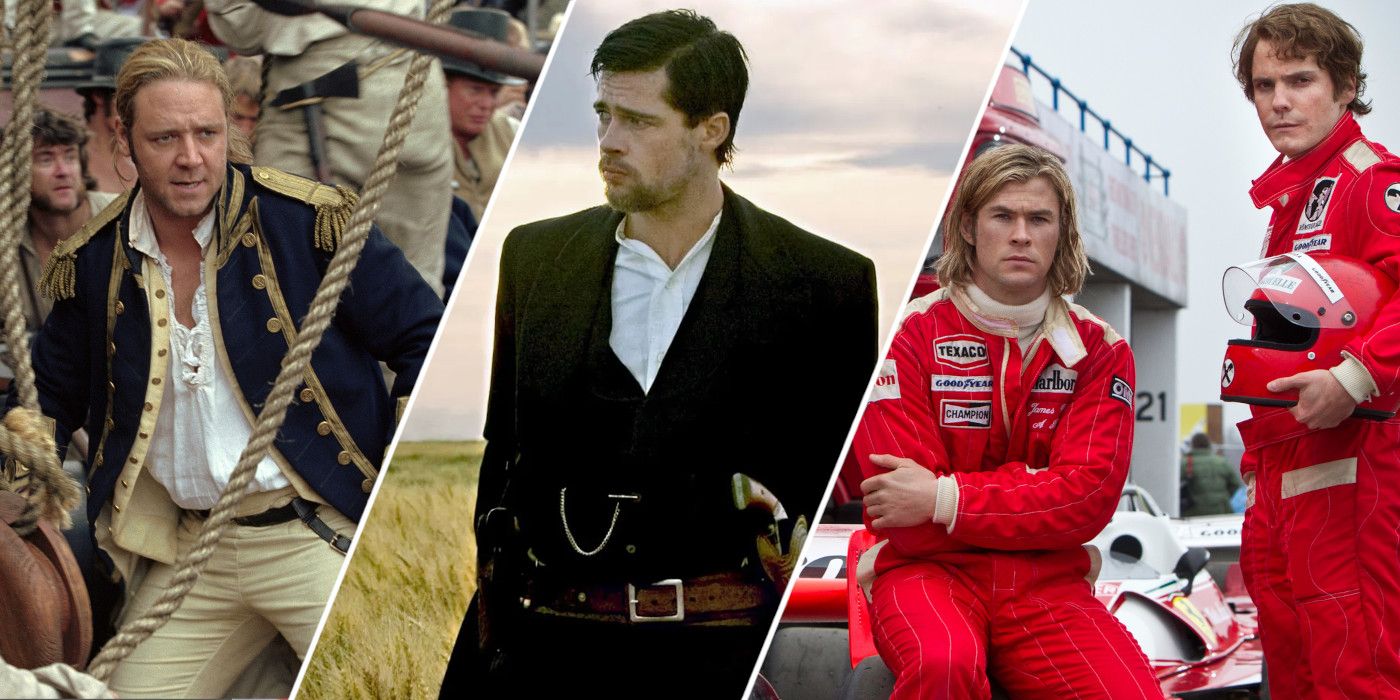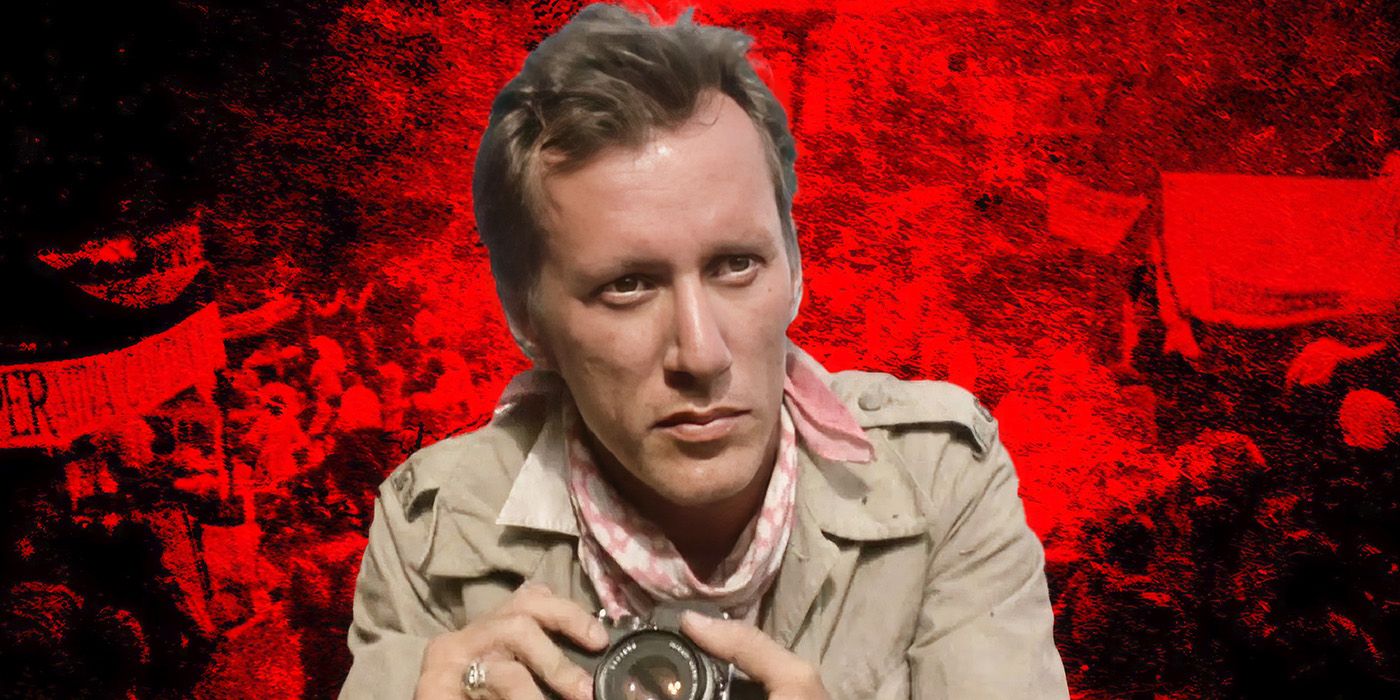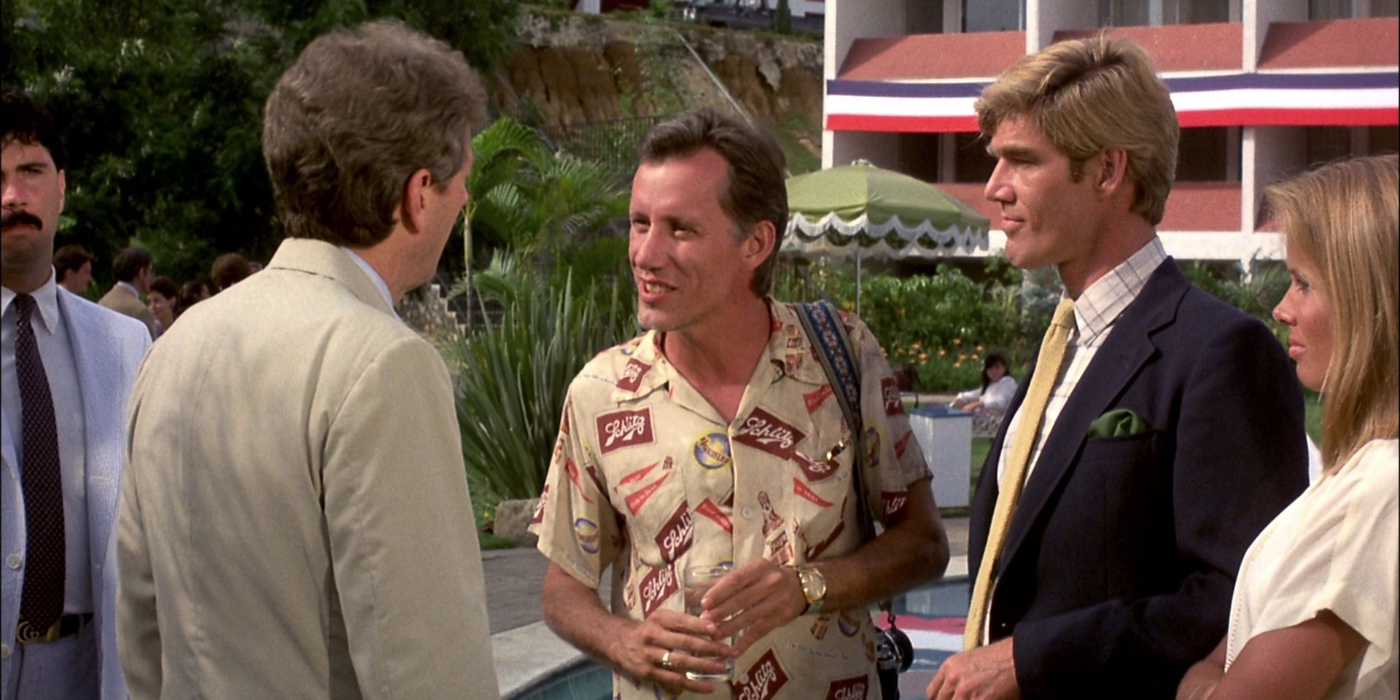The Big Picture
- Alex Garland’s
Civil War
depicts a version of the United States where civil war breaks out. - Oliver Stone’s movie
Salvador,
starring James Woods and Jim Belushi, follows a civil war that actually happened in real-life. - Though not entirely historically accurate,
Salvador
captures the horrifying reality if the civil war, and the major events that occurred.
Despite finding success as a screenwriter with films like Midnight Express and Scarface, the former of which earned him his first Oscar, Oliver Stone didn’t truly become a household name until he directed back-to-back films in 1986. The tail end of the year saw the release of Platoon, Stone’s semi-autobiographical Vietnam War film that earned him his second Oscar and grossed an impressive $137 million. But released earlier in the year was Salvador, an overlooked yet equally compelling glimpse into the past through a firsthand account of real-world events.
Based on the experiences of an American photojournalist who traveled to El Salvador in the early ’80s to document a devastating conflict that would ultimately wreak havoc for more than a decade, Salvador paints a semi-fictionalized yet harrowing portrait of a nation torn apart by civil war. Raw and unrelenting, the low-budget drama laid the foundation for much of Stone’s later work as a provocative filmmaker, enduring as a quintessential cinematic depiction of wartime gonzo journalism. But unlike a fictional film exploring a similar subject, like Alex Garland‘s Civil War, Salvador‘s lasting impact derives not only from its powerful storytelling but a factual basis in the sobering nature of reality.

Salvador
In the midst of a violent civil conflict in El Salvador, an American photojournalist and his local friend navigate the dangers of war to expose human rights abuses to the international community. Their journey through contested territories reveals the harsh realities of war, challenging their ethics and risking their lives for truth.
- Release Date
- April 23, 1986
- Director
- Oliver Stone
- Cast
- James Woods , Jim Belushi , Michael Murphy , john savage , Elpidia Carrillo , Tony Plana , Colby Chester , Cynthia Gibb
- Runtime
- 122 Minutes
- Main Genre
- Drama
- Writers
- Oliver Stone , Richard Boyle
What Is Oliver Stone’s ‘Salvador’ About?
Following the gonzo exploits of journalist Richard Boyle (portrayed in the film by James Woods), who co-wrote the film’s screenplay with Oliver Stone, Salvador takes place in 1980 and ’81 and recounts the daredevil journalist’s experiences navigating the titular country’s brutal battle between warring factions. Down on his luck, and alongside his friend and disc jockey, Doctor Rock (Jim Belushi), Boyle weaves his way through a variety of parties involved in the conflict, from local military personnel and guerrilla rebels to American media and government advisors. During his time in the country, he reunites with familiar faces, including fellow photojournalist John Cassady (John Savage) and Maria (Elpidia Carrillo), the latter of whom he rekindles his relationship with and, along with her children, attempts to get out of the country before all hell breaks loose.
Initially hard-partying and cynical in his approach to documenting the Salvadoran Civil War, Boyle’s rogue escapades in the ravaged nation gradually erode his abrasive self-importance, replacing it with a recognition of the heart-wrenching plight of civilians and peaceful voices caught in the crossfire. Like several of Oliver Stone’s protagonists, Boyle ultimately emerges as a humble observer and truth-seeker, both peripherally and directly, caught up in a seemingly infinite and complex world of ideology, corruption, violence, and human suffering. While he ultimately escapes the war-torn country in one piece, his photos and subsequent writings regarding the atrocities inflicted on the citizens of El Salvador would help inform the world of the ongoing civil war, as well as the United States’ financial and military backing of the nation’s right-wing government in its fight against left-wing rebels.
How Much of ‘Salvador’ Is Historically Accurate?
Oliver Stone does an admirable and effective job of giving audiences a dramatic glimpse behind the scenes and on the front lines of the Salvadoran Civil War. But for the sake of dramatic license and narrative efficiency, Salvador isn’t an exact account of Richard Boyle’s journey and some of the events depicted didn’t actually happen as shown. The film’s opening disclaimer reads, “This film is based on events that occurred in 1980-1981. Characters have been fictionalized.” Aside from Boyle, the vast majority of Salvador‘s key players are stand-ins for real-life counterparts, including American ambassador Robert E. White (played by Michael Murphy as Thomas Kelley) and the ruthless Salvadoran military officer Roberto D’Aubuisson (played by Tony Plana as Major Maximiliano Casanova). As for John Cassady, Boyle’s friend and fellow photojournalist, The Guardian reported that no such individual existed, though it stands to reason the character served as an amalgamation of real-life individuals.

10 Most Historically Accurate Movies, According to Reddit
Reddit’s film and history buffs intersect and praise these classic period pieces.
Among the pivotal historical events depicted in Salvador is the March 1980 assassination of Archbishop Oscar Romero, which Boyle was allegedly not present for as he is in the film. Salvador also recounts the brutal rape and murder of four American clergy members that occurred on December 2, 1980. While the film depicts the horrific event with unflinching authenticity and portrays one of the women as a friend (Cindy Gibb) of Boyle’s, it’s unclear whether they were close or knew each other in real life. The film’s treatment of the fate of Boyle’s girlfriend, Maria, has also been called into question. Salvador depicts her as being apprehended by the United States border patrol and sent back to her ravaged homeland, but according to The Guardian, this never happened. Regardless of its dramatic flourishes and secondary details, however, Stone’s historical drama largely adheres to accuracy when considering the bigger picture of the Salvadoran Civil War.
‘Salvador’s Real-Life Story Explores the Horrors of War
As a phenomenon that’s afflicted humanity for centuries, civil war will always serve as a sobering reminder of the imperfections, vulnerabilities, and fraught relational tendencies inherent to civilization, and Salvador‘s real-life basis makes it an especially affecting and humbling reminder of such age-old conflicts. To be fair, while Oliver Stone has never been known for subtlety, his 1986 film doesn’t rely nearly as much on the political commentary that would imbue some of his later work, but rather on a more visceral, matter-of-fact approach to dropping audiences into one harrowing scenario after another. Like Alex Garland’s Civil War, Salvador is less concerned with ideology than exploring the nature of life and death amid a brutal conflict, eschewing overt favoritism for one warring faction over another.
In the way that Garland’s thriller does, Stone’s drama assumes the intimate, third-party perspective of journalists, largely distancing viewers from commentary steeped in political screeds and hand-wringing. Sure, Stone has a well-established reputation for expressing left-leaning ideological sentiments, but this film is restrained, exploring the political implications of its subject without waving a righteous finger. Similar to Civil War, Salvador takes viewers on an emotional and experiential journey, prioritizing observation over divisive analysis, and its historical inspiration is the cherry on top in terms of packing a gut-wrenching punch. Whether we’re following Garland’s troupe of photojournalists or Richard Boyle as they weave their way through complete and utter devastation with little more than a camera, we’re far more concerned with their survival than who they align with politically.
Salvador is available to watch on Tubi in the U.S.























































![Social Media Spring Cleaning [Infographic] Social Media Spring Cleaning [Infographic]](https://imgproxy.divecdn.com/9e7sW3TubFHM00yvXe5zvvbhAVriJiGqS8xmVFLPC6s/g:ce/rs:fit:770:435/Z3M6Ly9kaXZlc2l0ZS1zdG9yYWdlL2RpdmVpbWFnZS9zb2NpYWxfc3ByaW5nX2NsZWFuaW5nMi5wbmc=.webp)
![5 Ways to Improve Your LinkedIn Marketing Efforts in 2025 [Infographic] 5 Ways to Improve Your LinkedIn Marketing Efforts in 2025 [Infographic]](https://imgproxy.divecdn.com/Hv-m77iIkXSAtB3IEwA3XAuouMwkZApIeDGDnLy5Yhs/g:ce/rs:fit:770:435/Z3M6Ly9kaXZlc2l0ZS1zdG9yYWdlL2RpdmVpbWFnZS9saW5rZWRpbl9zdHJhdGVneV9pbmZvMi5wbmc=.webp)














